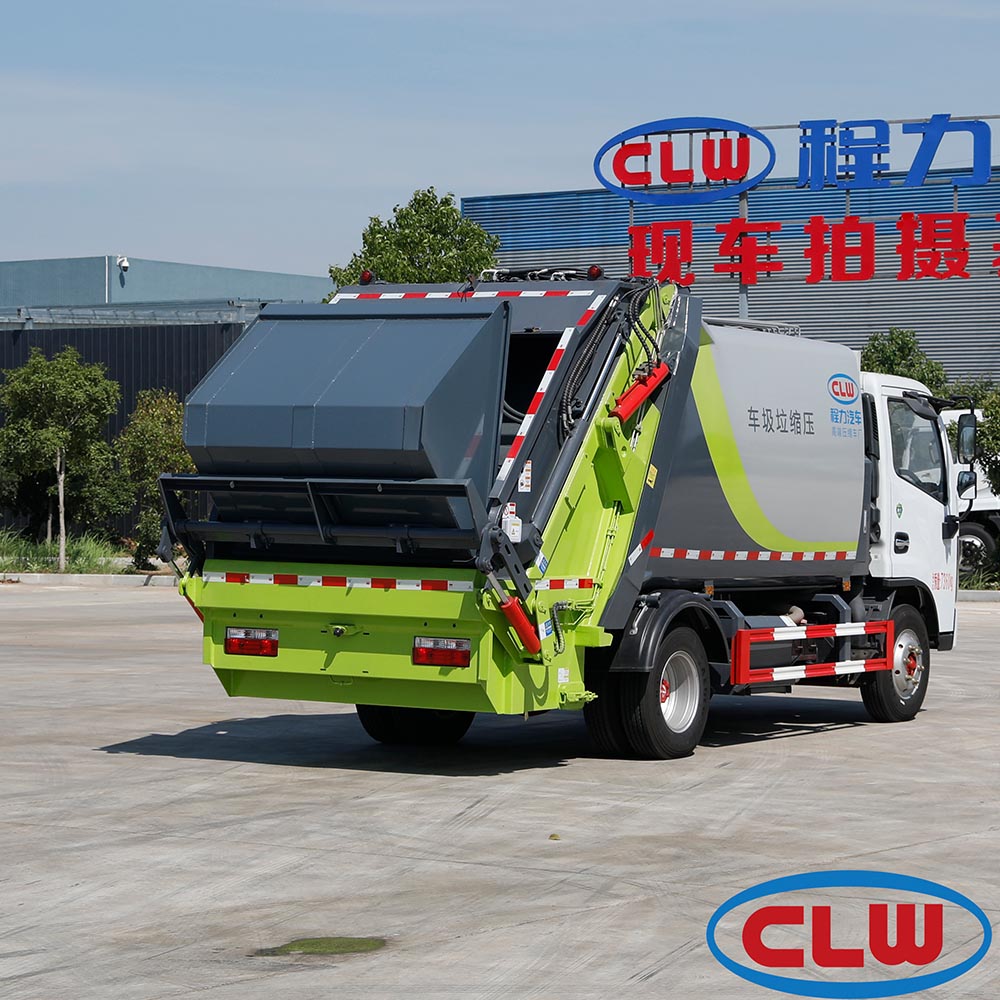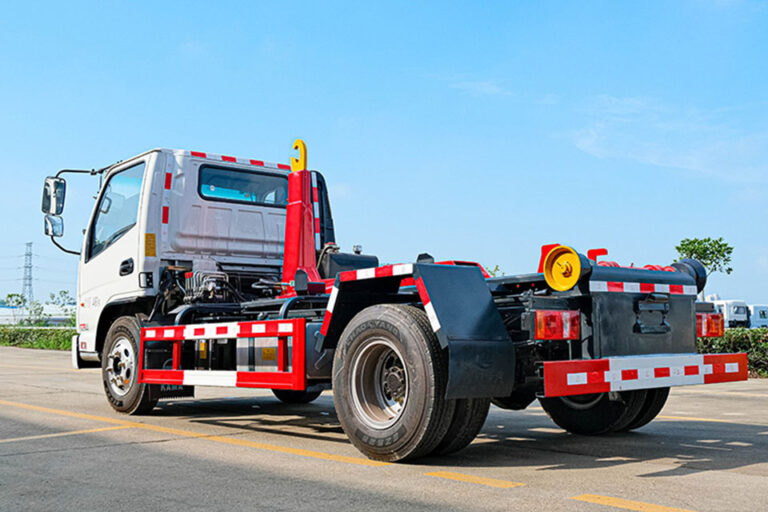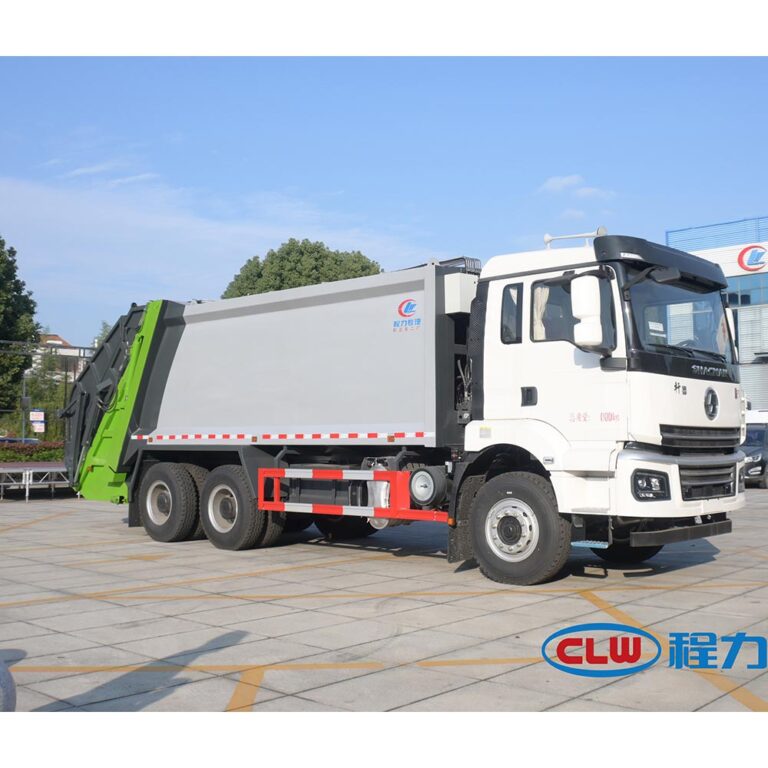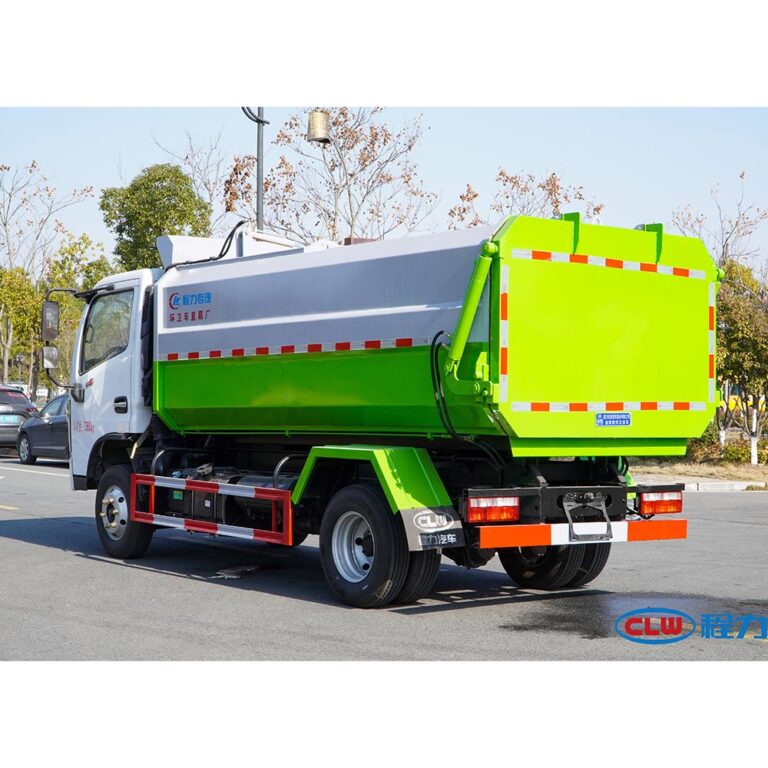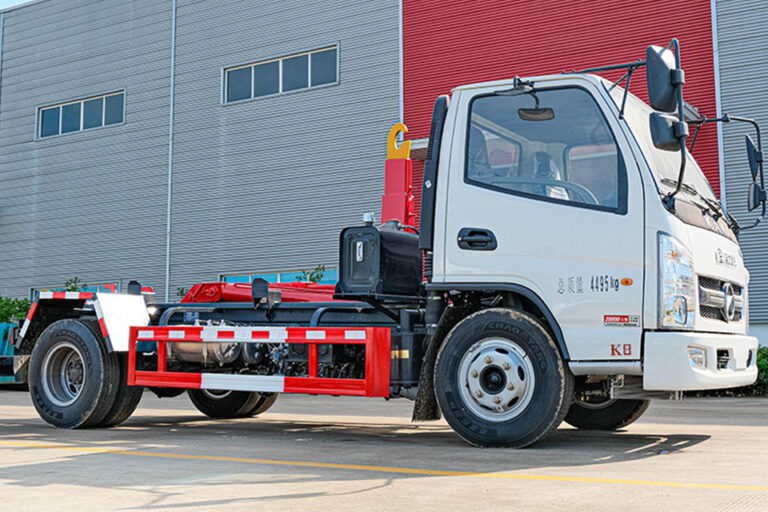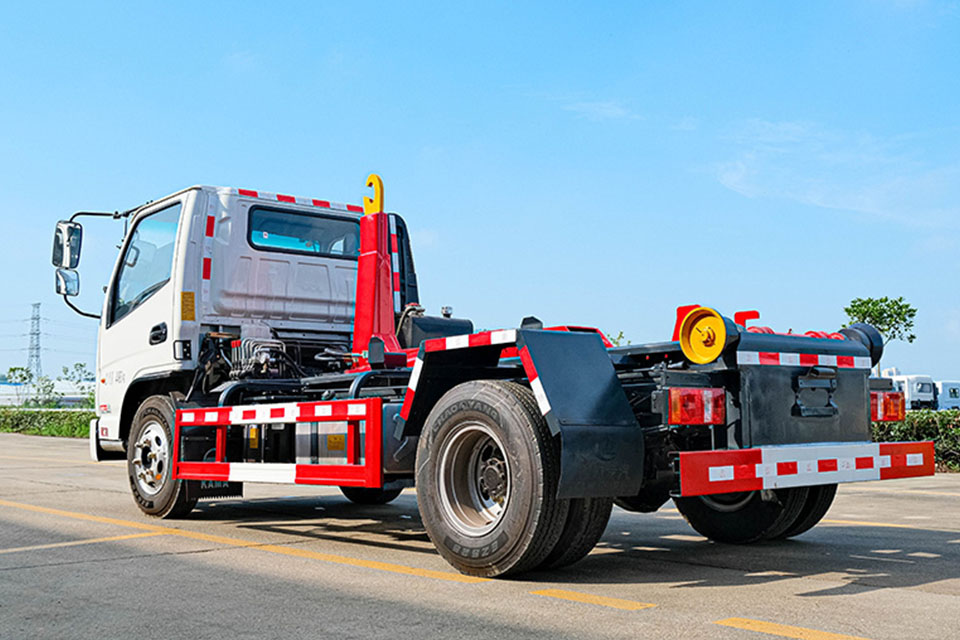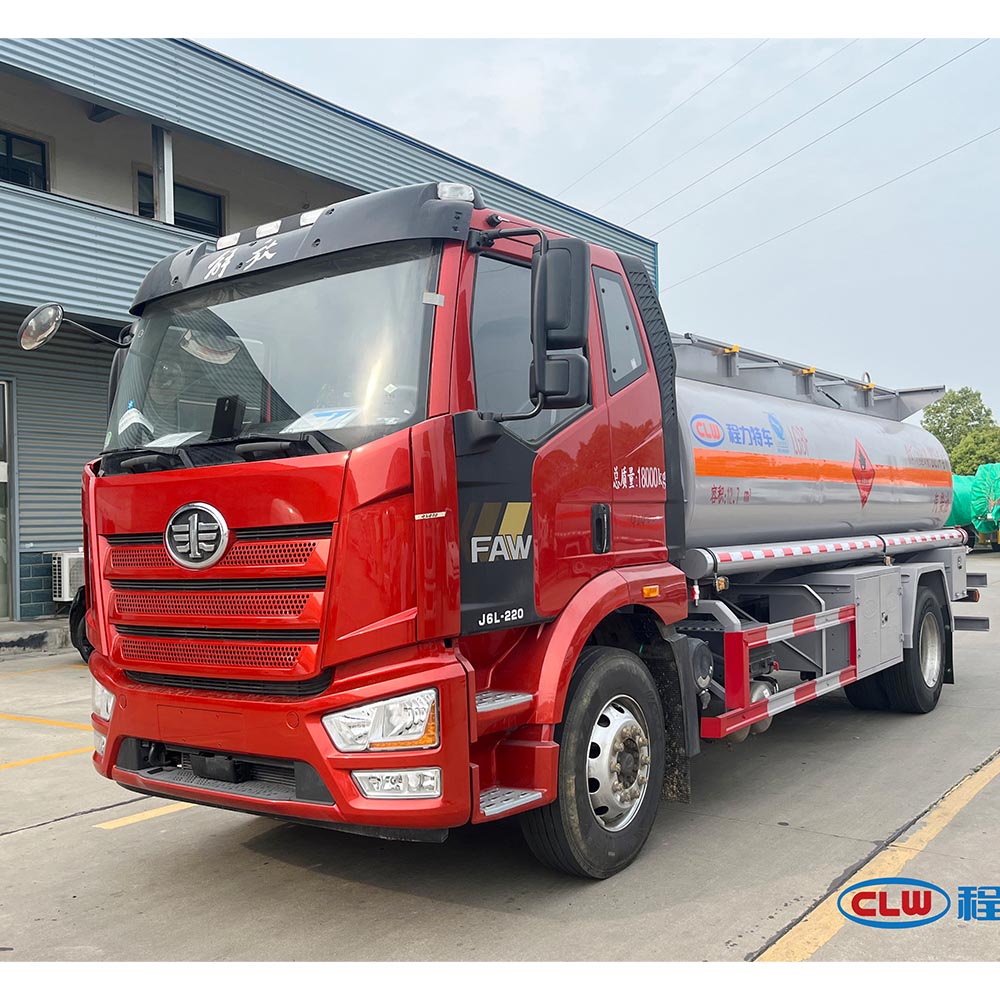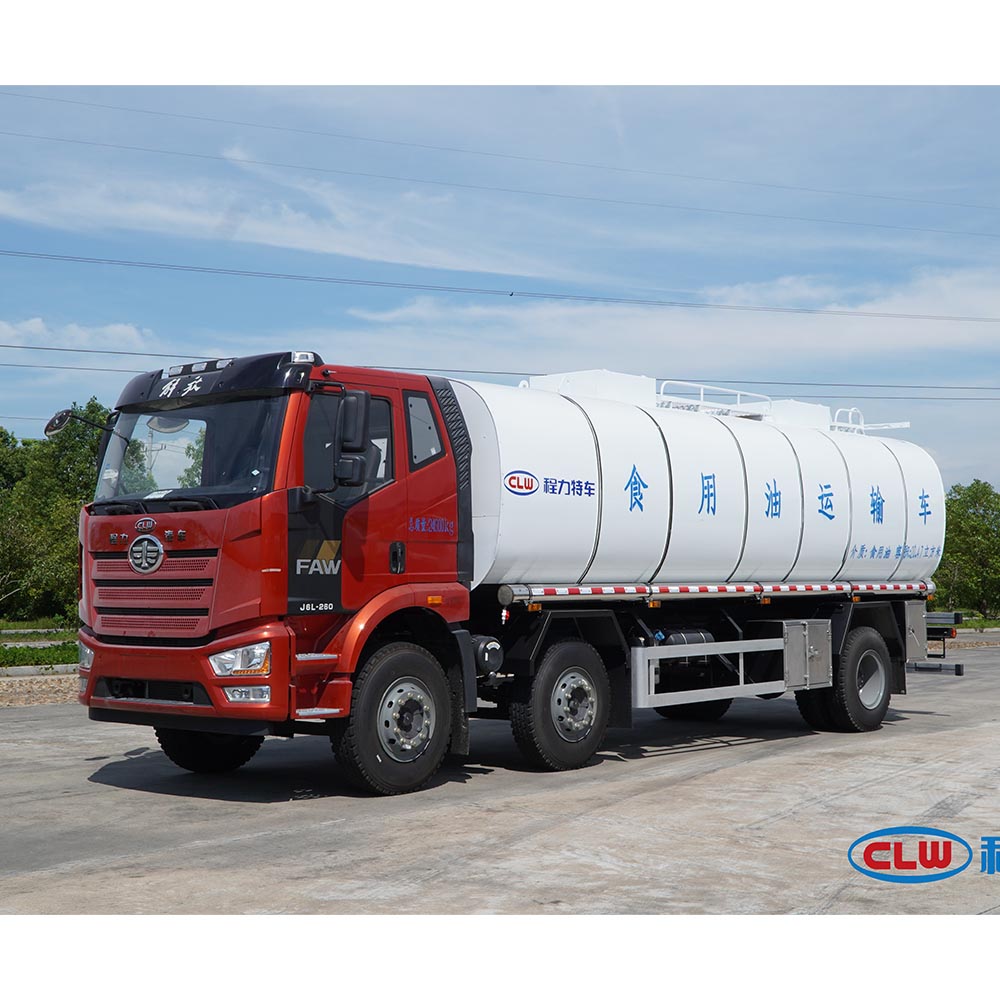-
Parc industriel automobile de Chengli
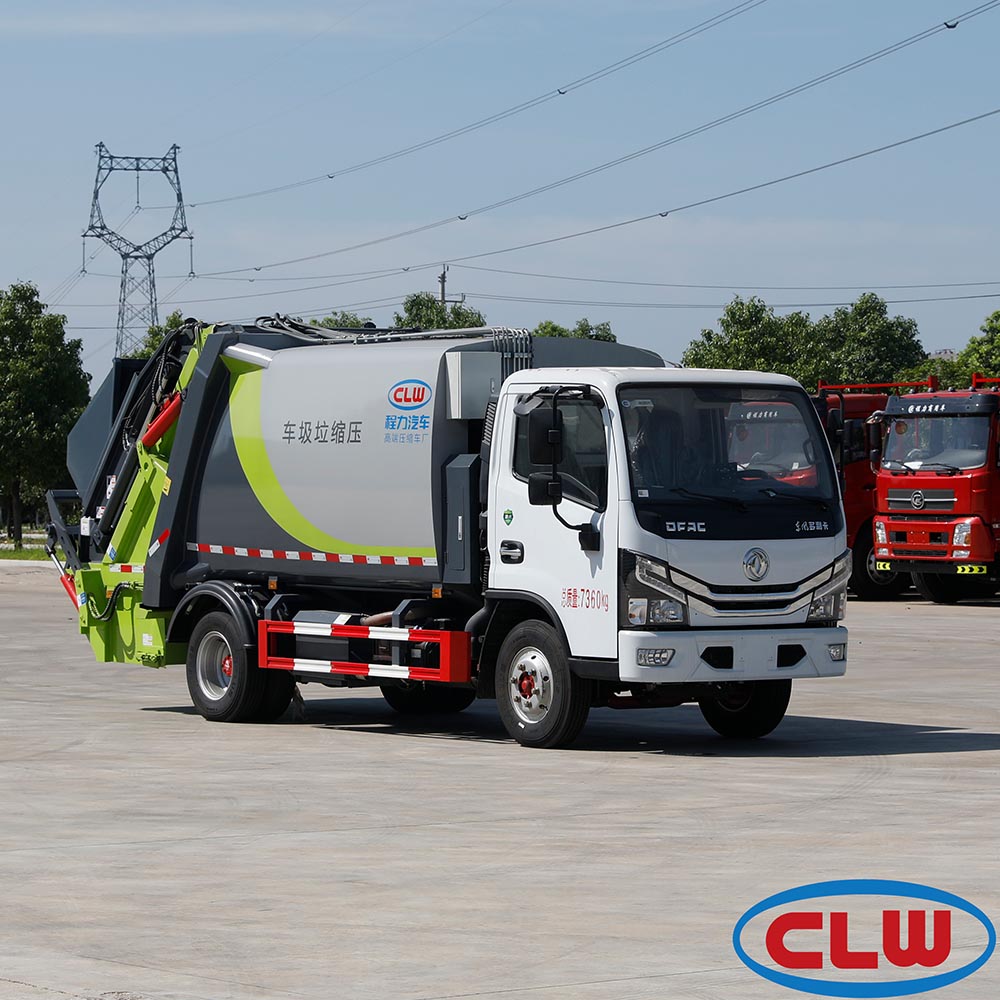
l'efficacité écologique l'essor des camions-poubelles au gaz naturel
Alimenter l'avenir : Comment les camions à gaz naturel révolutionnent la gestion des déchets
Cet article explore l'impact transformateur de la camions à ordures au gaz naturel sur le gestion des déchets Il offre une vue d'ensemble de leurs avantages, de leurs défis et de leur potentiel futur. Il s'agit d'un ouvrage incontournable pour tous ceux qui souhaitent comprendre comment ces technologies sont utilisées. écologique ouvrent la voie à une approche plus propre et plus durable de la collecte des déchets. En tant que leader de l camion à ordures comprimé Nous nous engageons à fournir des solutions innovantes qui répondent aux besoins évolutifs de nos clients, y compris les services d'assainissement municipaux, Agences de gestion des déchetset les services de travaux publics, entre autres. Cet article est rédigé par des experts du secteur pour des professionnels du secteur, et nous espérons qu'après l'avoir lu, vous comprendrez pourquoi travailler avec nous est le bon choix.
Table des matières
Quelles sont les principales différences entre les camions à ordures fonctionnant au gaz naturel et ceux fonctionnant au diesel ?
Camions-poubelles au gaz naturel et camions à ordures diesel diffèrent principalement par leur carburant source et émission des profils. Camions au gaz naturel utiliser soit des gaz naturel (GNC) ou liquéfié gaz naturel (GNL), tandis que les camions diesel s'appuyer sur carburant diesel.
- Source de carburant : Gaz naturel est une combustion plus propre carburant par rapport à diesel. Il est principalement composé de méthane, dont la teneur en carbone est plus faible que celle du gaz naturel. diesel.
- Émissions : Camions au gaz naturel produisent beaucoup moins de substances nocives émissions que camions diesel. Ils émettent moins d'oxydes d'azote (NOx), les particules et les émissions de gaz à effet de serre (GES). Par exemple, véhicules au gaz naturel (GNV) peuvent réduire les émissions de Émissions de NOx jusqu'à 90% et les particules de près de 100% par rapport au diesel véhicules.
- Stockage de carburant : Gaz naturel est stocké dans des réservoirs à haute pression (GNC) ou dans des réservoirs cryogéniques (GNL), tandis que le diesel est stocké sous forme liquide dans carburant des chars d'assaut.
L'une des distinctions les plus importantes entre gaz naturel et camions à ordures diesel se trouve dans leur carburant des systèmes d'alimentation en eau. Gaz naturel Les véhicules utilisent des carburant des réservoirs de stockage conçus pour manipuler soit des gaz naturel (GNC) ou liquéfié gaz naturel (GNL). Le GNC est stocké à haute pression, généralement entre 3 000 et 3 600 psi, tandis que le GNL est stocké dans des réservoirs cryogéniques à des températures extrêmement basses (-260°F). Ces méthodes de stockage contrastent fortement avec camions dieselqui stockent simplement carburant diesel sous forme liquide dans les limites des carburant des chars d'assaut.
Comment les camions à ordures au gaz naturel contribuent-ils à la durabilité environnementale ?
Camions-poubelles au gaz naturel jouent un rôle crucial dans la promotion de l'environnement la durabilité. Gaz naturel est considéré comme un carburant propre parce qu'il brûle nettoyeur que dieselLa réduction des effets nocifs de l'alcool sur la santé et l'environnement. émissions. L'utilisation de gaz naturel en camions à ordures contribue à réduire la pollution de l'air et à atténuer l'impact des émissions de gaz à effet de serre. gestion des déchets sur l'environnement.
- Réduction des émissions : Camions au gaz naturel émettent des niveaux de polluants nettement inférieurs, notamment NOxles matières particulaires, et GES. Cela permet d'améliorer la qualité de l'air. qualité et réduire l'empreinte carbone des services de collecte des déchets. Les camions au gaz naturel produisent moins d'émissions et les camions émettent moins de polluants dans l'atmosphère, ce qui contribue à un environnement plus sain. Cette réduction est particulièrement importante dans les zones urbaines où l'air est plus pur. qualité est une préoccupation majeure. En adoptant gaz naturelLes municipalités peuvent ainsi démontrer leur engagement en faveur de la santé publique et de la protection de l'environnement. objectifs de développement durable.
- Gaz naturel renouvelable (GNR) : Utilisation RNGégalement connu sous le nom de biométhane, renforce encore les avantages environnementaux. RNG est dérivé de produits biologiques déchets Les sources d'énergie telles que les décharges et les déchets agricoles, ce qui en fait une source d'énergie importante pour l'économie. les énergies renouvelables source. En utilisant RNG, gestion des déchets les entreprises peuvent réaliser des réductions encore plus importantes de leurs émissions de gaz à effet de serre. Émissions de GES. RNG est un programme durable carburant option qui réduit la dépendance à l'égard des combustibles fossiles carburants et soutient l'économie circulaire en réutilisant les déchets organiques. déchets.
- Réduction des gaz à effet de serre : Gaz naturel produit moins de dioxyde de carbone (CO2) par rapport à diesel. Quand RNG est utilisée, la réduction de la émissions de gaz à effet de serre peut être encore plus importante, car RNG peuvent être neutres en carbone, voire négatifs. Des études montrent que RNG peut réduire Émissions de GES jusqu'à 70% par rapport aux diesel. Les avantages du gaz naturel comprennent une réduction substantielle des les émissions de gaz à effet de serre.
Quels sont les avantages économiques de l'utilisation du gaz naturel dans les camions à ordures ?
L'adoption de camions à ordures au gaz naturel offre plusieurs avantages économiques pour flotte des opérateurs. Voici quelques avantages clés :
- Réduction des coûts de carburant : Gaz naturel, en particulier le GNC, est souvent moins cher que le gaz naturel. carburant diesel. Cela peut se traduire par des économies significatives en coût du carburant sur la durée de vie d'un camion. Les coût du gaz naturel tend à être plus stable que le diesel de l'UE, ce qui permet d'améliorer la prévisibilité du budget de l'UE. flotte des opérateurs. Réduction des coûts de carburant faire gaz naturel une option attrayante pour les municipalités et les gestion des déchets les entreprises qui cherchent à réduire leurs dépenses opérationnelles. En outre, la stabilité des prix des gaz naturel aide à la planification financière à long terme.
- Réduction des coûts de maintenance : Moteurs à gaz naturel ont moins de pièces mobiles que les moteurs diesel, ce qui peut conduire à une baisse de la coûts de maintenance. Gaz naturel brûlures nettoyeuret de réduire ainsi l'usure de l'appareil. moteur des composants. La simplicité des moteur à gaz naturel peut se traduire par des factures de réparation moins élevées et moins de temps d'arrêt pour les utilisateurs. camions. Cela peut constituer un avantage important pour flotte les opérateurs gérant un grand nombre de véhicules.
- Mesures d'incitation et subventions : De nombreux gouvernements proposent des mesures d'incitationLes entreprises peuvent bénéficier de subventions, de remises et d'aides pour encourager l'utilisation de l'énergie solaire dans les pays en développement. l'adoption de véhicules au gaz naturel. Ces incitations financières peuvent contribuer à compenser l'investissement initial en camions au gaz naturel et des infrastructures. Les municipalités et les gestion des déchets Les entreprises peuvent profiter de ces programmes pour réduire les coûts initiaux de la transition vers un système de gestion des déchets. flotte de gaz naturel.
Quels sont les aspects opérationnels d'une flotte au gaz naturel ?
Transition vers une flotte de gaz naturel implique plusieurs considérations opérationnelles. Voici quelques facteurs clés à garder à l'esprit :
- L'infrastructure d'alimentation en carburant : L'une des principales considérations est la disponibilité des stations de ravitaillement en gaz naturel. Alors que le nombre de véhicules GNC et GNL stations de ravitaillement en carburant se développe dans l'ensemble des États-Unis.mais elle peut encore être limitée dans certaines régions. La flotte Les opérateurs doivent s'assurer qu'ils ont accès à des ravitaillement en carburant l'infrastructure. Construire sur place stations de ravitaillement en carburant peut être une option viable pour les flottes. Une planification et un investissement adéquats dans ravitaillement en carburant sont essentiels pour une transition réussie vers l'économie de marché. gaz naturel.
- Gamme de véhicules : Camions au gaz naturel peut avoir une portée plus courte que celle du camions dieselen fonction de la taille de la carburant les réservoirs de stockage et le type de gaz naturel utilisé (GNC ou GNL). La flotte les opérateurs doivent tenir compte des exigences de portée de leurs itinéraires et veiller à ce que camions au gaz naturel peut répondre à ces besoins. Le GNL offre généralement une plus grande autonomie que le GNC, ce qui le rend adapté aux trajets plus longs.
- Formation et entretien : Fonctionnement et entretien camions au gaz naturel nécessitent une formation spécialisée pour les conducteurs et les mécaniciens. La flotte les opérateurs doivent investir dans des programmes de formation pour s'assurer que leur personnel est bien informé sur les sujets suivants véhicule au gaz naturel de la technologie. Un entretien adéquat est essentiel pour garantir la longévité et la fiabilité de l'appareil. camions au gaz naturel.
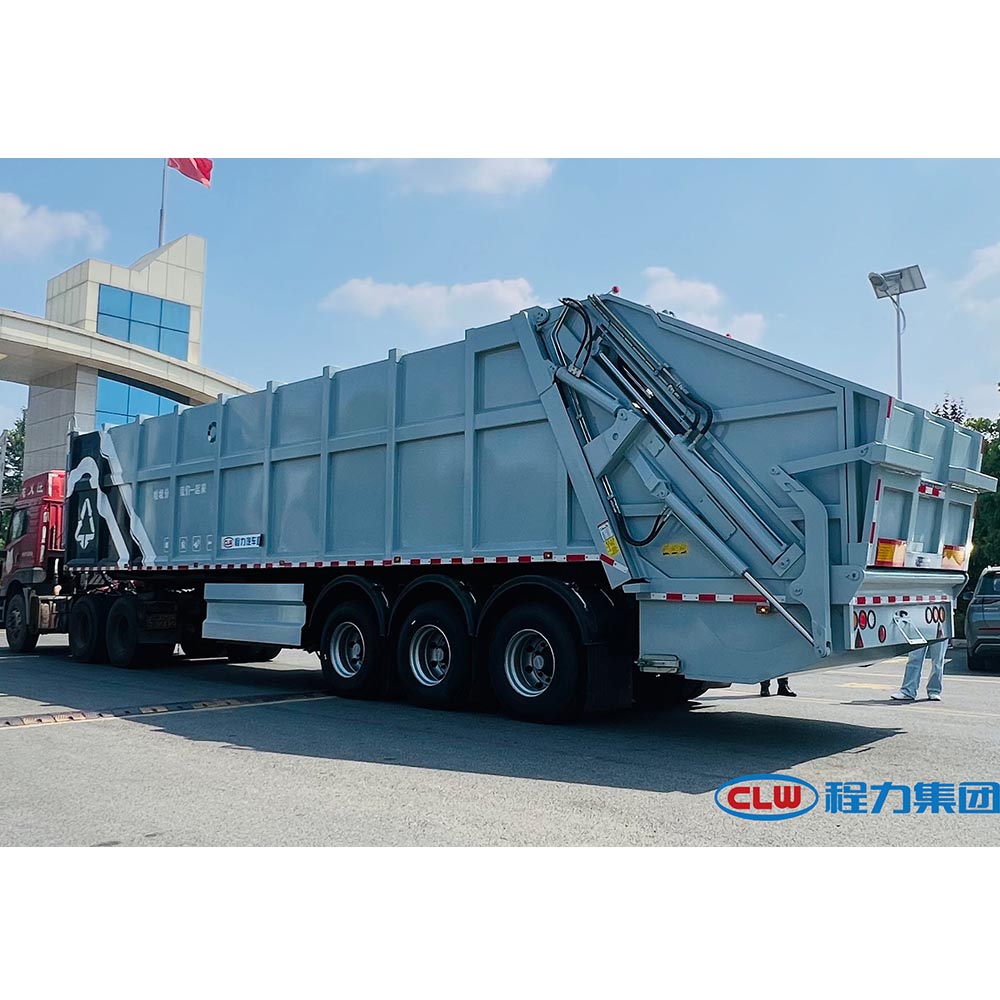
Comment les performances des moteurs au gaz naturel se comparent-elles à celles des moteurs diesel ?
Moteurs à gaz naturel offrent des performances comparables à celles des moteurs diesel à bien des égards. Moteurs à gaz naturel offrent des niveaux de puissance et de couple similaires, ce qui les rend adaptés aux applications lourdes telles que gestion des déchets.
- Puissance et couple : Moteurs modernes au gaz naturel sont conçus pour offrir des performances comparables à celles des moteurs diesel. Ils peuvent fournir la puissance et le couple nécessaires à des tâches exigeantes, telles que le fonctionnement de systèmes hydrauliques dans des installations de traitement des eaux usées. camions à ordures. Moteurs à gaz naturel sont capables de répondre aux exigences rigoureuses de la collecte des déchets, en veillant à ce que camions peuvent s'acquitter efficacement de leurs tâches.
- Efficacité énergétique : Les efficacité énergétique de camions au gaz naturel est généralement comparable à celle de camions diesel. Progrès en matière de moteur à gaz naturel La technologie a été améliorée consommation de carburant taux d'intérêt, ce qui rend gaz naturel un viable alternative au diesel en termes de efficacité énergétique. Tandis que consommation de carburant peut varier en fonction de la situation spécifique de l'entreprise. moteur et les conditions de fonctionnement, camions au gaz naturel peut atteindre un kilométrage similaire à celui d'un camions diesel.
- Fiabilité : Moteurs à gaz naturel sont réputés pour leur fiabilité et leur durabilité. Avec un entretien adéquat, ils peuvent offrir une longue durée de vie, comparable à celle de moteurs diesel. Moteur à gaz naturel La technologie a considérablement évolué, ce qui permet d'obtenir des produits robustes et fiables. moteurs qui peuvent résister aux rigueurs d'une utilisation quotidienne en gestion des déchets des opérations.
Quels sont les défis liés à l'adoption des camions à ordures fonctionnant au gaz naturel ?
Bien qu'il y ait de nombreux avantages à utiliser camions à ordures au gaz naturelMais il y a aussi des défis à relever :
- Investissement initial : Le coût initial de l'achat camions au gaz naturel et la construction ravitaillement en carburant peuvent être plus élevées que pour les camions diesel. Toutefois, cet investissement initial peut être compensé par des coûts d'exploitation plus faibles et par les incitations disponibles. La flotte les opérateurs doivent effectuer une analyse coûts-avantages approfondie pour déterminer la viabilité financière à long terme de la transition vers les gaz naturel.
- L'infrastructure d'alimentation en carburant : La disponibilité limitée des stations de ravitaillement en gaz naturel dans certaines régions peut constituer un obstacle à l'adoption. L'élargissement du réseau des stations de ravitaillement en carburant est essentielle pour soutenir la croissance de l flottes au gaz naturel. Les partenariats public-privé peuvent jouer un rôle dans le développement des infrastructures nécessaires.
- Gamme de véhicules : La portée plus courte de certains camions au gaz naturel par rapport à camions diesel peut être un problème pour certaines applications. Toutefois, les progrès réalisés dans le domaine de la carburant La technologie de stockage et l'utilisation du GNL peuvent contribuer à résoudre ce problème. La flotte les opérateurs doivent évaluer soigneusement leurs besoins en matière d'itinéraires et choisir le système approprié. carburant les options de stockage.
Existe-t-il différents types de gaz naturel utilisés dans les camions à ordures ?
Oui, il existe principalement deux types de gaz naturel utilisé comme carburant en camions à ordures: compressé gaz naturel (GNC) et les carburants liquéfiés gaz naturel (GNL).
- Gaz naturel comprimé (GNC) : Le GNC est gaz naturel qui a été comprimé à une pression élevée, généralement entre 3 000 et 3 600 psi. Il est stocké dans des réservoirs à haute pression sur le site de l'usine. camion. Le GNC est un choix populaire pour camions à ordures en raison de sa plus faible coût et une large disponibilité. Bennes à ordures au GNC sont bien adaptés aux itinéraires urbains où les stations de ravitaillement en carburant sont plus facilement disponibles.
- Gaz naturel liquéfié (GNL) : Le GNL est gaz naturel qui a été refroidi à l'état liquide à des températures extrêmement basses (-260°F). Il est stocké dans des réservoirs cryogéniques sur le camion. Le GNL a une densité énergétique plus élevée que le GNC, ce qui signifie qu'il peut offrir une plus grande autonomie. Le GNL est souvent utilisé dans les camions lourds qui nécessitent une plus grande portée.
Le GNC et le GNL offrent tous deux avantages pour l'environnement plus dieselmais le choix entre les deux dépend de facteurs tels que carburant la disponibilité, les exigences en matière d'autonomie, et coût des considérations.
Comment les camions à ordures fonctionnant au gaz naturel améliorent-ils la qualité de l'air ?
Camions-poubelles au gaz naturel améliorer de manière significative la qualité de l'air qualité en réduisant les effets nocifs émissions par rapport à camions à ordures diesel. Gaz naturel ne produit pratiquement pas de particules et des niveaux nettement inférieurs d'oxydes d'azote (NOx), qui contribuent tous deux de manière importante à la pollution de l'air.
- Réduction des particules : Moteurs à gaz naturel ne produisent pratiquement pas de particules, qui sont des polluants importants associés à des problèmes de santé respiratoire et cardiovasculaire. Il s'agit d'un avantage majeur dans les zones urbaines où la qualité de l'air est très faible. qualité est un sujet de préoccupation.
- Réduction des NOx : Camions au gaz naturel émettent des niveaux significativement plus faibles de NOxqui contribuent au smog et aux pluies acides. Des études ont montré que véhicules au gaz naturel peut réduire Émissions de NOx jusqu'à 90% par rapport aux diesel véhicules.
- Amélioration de la santé publique : En réduisant la pollution de l'air, camions à ordures au gaz naturel contribuent à l'amélioration de la santé publique, en particulier dans les zones densément peuplées. Un air plus pur peut entraîner une diminution des maladies respiratoires et une amélioration de l'état de santé général. qualité de la vie.
Quel est l'avenir du gaz naturel dans la gestion des déchets ?
L'avenir de la gaz naturel en gestion des déchets semble prometteuse. Les préoccupations relatives à la qualité de l'air qualité et émissions de gaz à effet de serre de plus en plus, la demande de produits plus propres carburant devrait augmenter. Gaz naturel, en particulier gaz naturel renouvelable (RNG), est bien placé pour jouer un rôle important dans la transition vers une économie plus durable. gestion des déchets l'industrie.
- Progrès technologiques : La technologie continue d'évoluer, ce qui a permis d'améliorer moteur à gaz naturel technologie, carburant les systèmes de stockage, et ravitaillement en carburant l'infrastructure. Ces progrès rendront gaz naturel une option encore plus attrayante pour les gestion des déchets des entreprises.
- Soutien politique : Partout dans le monde, les gouvernements mettent en œuvre des politiques visant à promouvoir l'utilisation de la technologies des véhicules propres, y compris véhicules au gaz naturel. Les mesures d'incitation, les mandats et les réglementations devraient favoriser la poursuite de la mise en œuvre de la politique de l'Union européenne en matière d'environnement et de développement durable. adoption du gaz naturel dans le gestion des déchets secteur.
- Le marché du GNR est en pleine croissance : Le marché des gaz naturel renouvelable (RNG) se développe rapidement. Comme plus déchets organiques est détourné des décharges et utilisé pour produire des RNGla disponibilité de cette carburant durable augmentera, ce qui en fait une option viable pour les flottes de gestion des déchets.
Comment les municipalités peuvent-elles passer à une flotte de camions à ordures fonctionnant au gaz naturel ?
Transition vers une flotte de camions à ordures au gaz naturel nécessite une planification minutieuse et une approche progressive. Voici quelques mesures que les municipalités peuvent prendre :
- Réaliser une étude de faisabilité : Évaluer la situation actuelle flotte, les exigences en matière d'itinéraires, ravitaillement en carburant les besoins en infrastructures et les économies potentielles.
- Élaborer un plan de transition : Élaborer un plan détaillé décrivant le calendrier, le budget, l'acquisition des véhicules, le développement des infrastructures et les besoins en formation.
- Assurer le financement : Étudier les mesures d'incitation, les subventions et les options de financement disponibles pour soutenir la transition.
- Construire une infrastructure de ravitaillement en carburant : Déterminer s'il faut construire sur place stations de ravitaillement en carburant ou s'appuyer sur les services publics existants stations de ravitaillement en carburant.
- Achat de véhicules : Sélectionnez la rubrique appropriée camions au gaz naturel (GNC ou GNL) en fonction des besoins opérationnels et de l'évolution de la demande. carburant disponibilité.
- Personnel des trains : Fournir une formation complète aux conducteurs et aux mécaniciens sur l'utilisation et l'entretien des véhicules. camions au gaz naturel.
- Contrôler et évaluer : Suivre les performances de la flotte de gaz naturel, y compris carburant consommation, coûts de maintenanceet émission réductions.
FAQ
Quel est le principal avantage de l'utilisation du gaz naturel dans les camions à ordures ?
Le principal avantage est la réduction significative des émissions nocives. émissionsy compris les oxydes d'azote (NOx), les particules et les émissions de gaz à effet de serreet donc une amélioration de la qualité de l'air. qualité et une empreinte environnementale plus faible. En utilisant gaz naturel en tant que carburant source dans camions à ordures offre des avantages environnementaux substantiels par rapport aux méthodes traditionnelles. diesel véhicules.
Quel est le coût du gaz naturel par rapport au diesel ?
Gaz naturelparticulièrement comprimée gaz naturel (GNC), est généralement moins cher que le carburant diesel. Il peut en résulter des coût du carburant sur la durée de vie d'un camion. Les baisse du coût du gaz naturel en fait une option économiquement attrayante pour les flotte des opérateurs.
Qu'est-ce que le gaz naturel renouvelable (GNR) ?
Gaz naturel renouvelable (RNG), également connu sous le nom de biométhane, est un biogaz qui a été transformé en gazoduc. qualité. Il est dérivé de déchets organiques des sources telles que les décharges, les déchets agricoles et les stations d'épuration des eaux usées. RNG est considéré comme un les énergies renouvelables et peut être utilisé comme moyen de transport carburant. RNG offre des réductions encore plus importantes en émissions de gaz à effet de serre par rapport à la méthode conventionnelle gaz naturel.
Les camions au gaz naturel sont-ils aussi puissants que les camions diesel ?
Oui, les moteurs modernes au gaz naturel sont conçus pour fournir une puissance et un couple comparables à ceux des moteurs diesel. Ils peuvent fournir les performances nécessaires pour des applications lourdes telles que gestion des déchets. Camions fonctionnant au gaz naturel sont capables de gérer les tâches exigeantes liées à la collecte des déchets.
Quels sont les défis liés à l'adoption de camions à ordures fonctionnant au gaz naturel ?
Les principaux défis sont notamment l'investissement initial plus élevé dans les véhicules et les ravitaillement en carburant l'infrastructure, la disponibilité limitée des stations de ravitaillement en gaz naturel dans certaines zones, et la possibilité d'une portée plus courte par rapport à la camions diesel. Toutefois, ces défis peuvent être relevés grâce à une planification minutieuse, à des investissements dans les infrastructures et à des avancées technologiques.
Comment les municipalités peuvent-elles passer à une flotte de camions à ordures fonctionnant au gaz naturel ?
Les municipalités peuvent effectuer la transition en réalisant une étude de faisabilité, en élaborant un plan de transition, en obtenant un financement, en construisant un système de gestion des déchets et en mettant en place un système de gestion des déchets. ravitaillement en carburant l'infrastructure, l'achat de véhicules, la formation du personnel et le suivi des performances. Une approche progressive est recommandée pour assurer une transition en douceur.
Conclusion
- Camions-poubelles au gaz naturel offrent des avantages environnementaux et économiques significatifs par rapport aux camions à ordures diesel.
- Utilisation gaz naturel en tant que carburant réduit les effets nocifs émissionsaméliore la qualité de l'air qualitéet réduit les coûts d'exploitation.
- Gaz naturel renouvelable (RNG) renforce encore les avantages pour l'environnement en fournissant un service d'information et de conseil aux entreprises. carburant durable source dérivée de déchets organiques.
- Bien qu'il existe des difficultés d'adoption, telles que l'investissement initial et les besoins en infrastructures, celles-ci peuvent être surmontées grâce à une planification minutieuse et aux mesures d'incitation disponibles.
- L'avenir de la gaz naturel en gestion des déchets semble prometteuse, les progrès technologiques et les politiques de soutien favorisant une adoption accrue.
- Municipalités et gestion des déchets les entreprises qui passent à la flottes au gaz naturel peuvent réaliser d'importantes économies, réduire leur impact sur l'environnement et contribuer à un avenir plus propre et plus durable.
- Notre camions à ordures à compression sont un excellent exemple de la efficacité et durabilité que l'on ne peut pas faire l'économie d'une gestion des déchets peuvent offrir. Par exemple, notre Camion à ordures comprimé Chengliwei et Benne à ordures à compression 5m³ offrent des performances exceptionnelles tout en minimisant l'impact sur l'environnement. Nos services Camion à ordures de 22 mètres cubes à chargement arrière et Semi-remorque à ordures à compression 47m³ sont conçus pour traiter efficacement de grands volumes de déchets, ce qui les rend idéaux pour les opérations à grande échelle. En outre, nos Camion-poubelle purement électrique représente la pointe de la technologie écologique la technologie de gestion des déchets.
En adoptant gaz naturel et autres technologies des véhicules propres, le gestion des déchets L'industrie agroalimentaire peut faire un grand pas vers un avenir plus durable. Contactez-nous pour en savoir plus sur nos produits.
